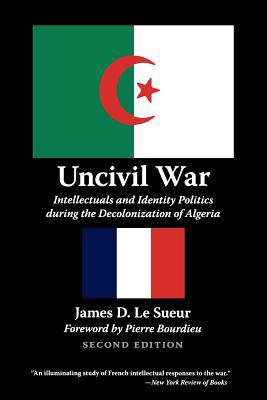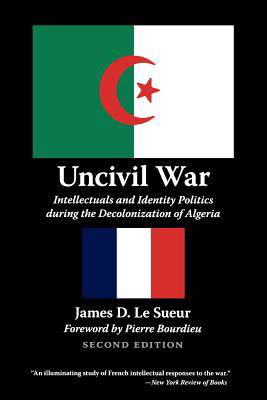
Door een staking bij bpost kan je online bestelling op dit moment iets langer onderweg zijn dan voorzien. Dringend iets nodig? Onze winkels ontvangen jou met open armen!
- Afhalen na 1 uur in een winkel met voorraad
- Gratis thuislevering in België vanaf € 30
- Ruim aanbod met 7 miljoen producten
Door een staking bij bpost kan je online bestelling op dit moment iets langer onderweg zijn dan voorzien. Dringend iets nodig? Onze winkels ontvangen jou met open armen!
- Afhalen na 1 uur in een winkel met voorraad
- Gratis thuislevering in België vanaf € 30
- Ruim aanbod met 7 miljoen producten
Zoeken
Uncivil War
Intellectuals and Identity Politics During the Decolonization of Algeria, Second Edition
James D Le Sueur
Paperback | Engels
€ 45,95
+ 91 punten
Omschrijving
Uncivil War is a provocative study of the intellectuals who confronted the loss of France's most prized overseas possession: colonial Algeria. Tracing the intellectual history of one of the most violent and pivotal wars of European decolonization, James D. Le Sueur illustrates how key figures such as Albert Camus, Jean-Paul Sartre, Simone de Beauvoir, Germaine Tillion, Jacques Soustelle, Raymond Aron, Claude Lévi-Strauss, Albert Memmi, Frantz Fanon, Mouloud Feraoun, Jean Amrouche, and Pierre Bourdieu agonized over the "Algerian question." As Le Sueur argues, these individuals and others forged new notions of the nation and nationalism, giving rise to a politics of identity that continues to influence debate around the world. This edition features an important new chapter on the intellectual responses to the recent torture debates in France, the civil war in Algeria, and terrorism since September 11.
Specificaties
Betrokkenen
- Auteur(s):
- Uitgeverij:
Inhoud
- Aantal bladzijden:
- 430
- Taal:
- Engels
Eigenschappen
- Productcode (EAN):
- 9780803280281
- Verschijningsdatum:
- 1/01/2006
- Uitvoering:
- Paperback
- Formaat:
- Trade paperback (VS)
- Afmetingen:
- 176 mm x 228 mm
- Gewicht:
- 630 g

Alleen bij Standaard Boekhandel
+ 91 punten op je klantenkaart van Standaard Boekhandel
Beoordelingen
We publiceren alleen reviews die voldoen aan de voorwaarden voor reviews. Bekijk onze voorwaarden voor reviews.











